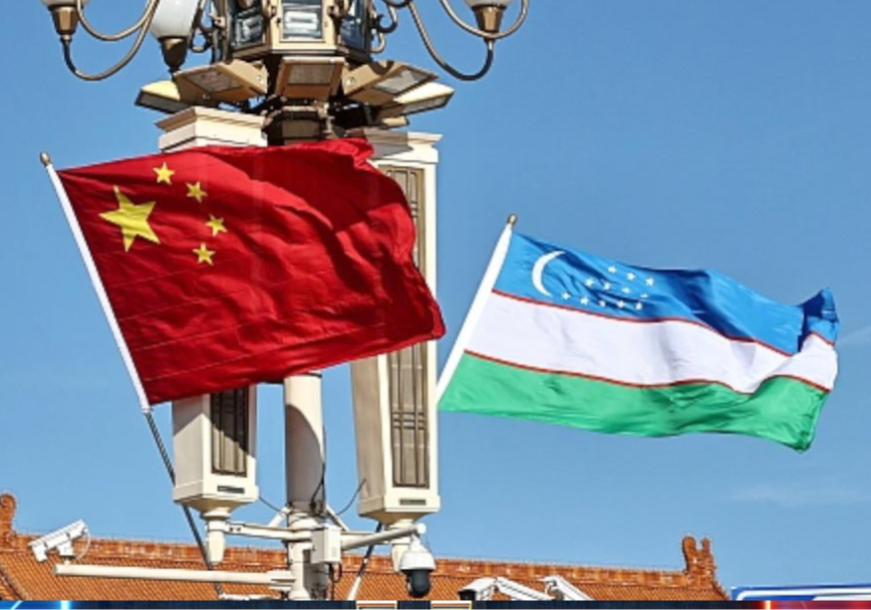
On 24 January, President of China Xi Jinping and his Uzbek counterpart, Shavkat Mirziyoyev, met at Tiananmen Square's Great Hall of People in Beijing. Both leaders decided to develop an “all-weather comprehensive strategic partnership for a new era” and signed 14 bilateral documents to boost diplomatic, security and commercial relations. With a shared vision for faster progress, both leaders also pressed for an earlier start date for the China-Kyrgyzstan-Uzbekistan (CKU) railway line, a project with roots in the 1990s. China's support of Uzbekistan's national sovereignty, territorial integrity, and independence during this complex global situation was not without reciprocation. Uzbekistan's president firmly backed the "One China" policy and denounced external interference in Taiwan, Xinjiang, and human rights concerns.
China's support of Uzbekistan's national sovereignty, territorial integrity, and independence during this complex global situation was not without reciprocation.
However, the timing of the Uzbek premier’s visit, right before the Global Gateway Investors Forum for EU-Central Asia, is no coincidence. The Global Gateway is being presented as a solution to avoid the debt traps associated with China's Belt and Road Initiative (BRI). Stuck in a geographical bind, Uzbekistan is trying to leverage its ties with China to smooth out its logistics and infrastructure. However, delays in CKU are pushing Tashkent to explore new options.
China's eye on the Uzbek market
Chinese investments in Uzbekistan have steadily climbed, likely due to the lower labour costs and potential emerging market in Central Asia, since the Ukraine war. With a population of over 33 million, Uzbekistan is the region's heavyweight. Its young population is growing fast, adding fresh blood to the workforce every year. Chinese companies in Uzbekistan grew to 2,000 by July 2022 from 1,800 in 2021. Following the high-level negotiations during the visit, both countries set the target of increasing trade to US$ 20 billion from US$ 14 billion in 2023, despite Uzbekistan running an acute trade deficit with China. According to the Chinese customs agency, out of the total bilateral trade of US$ 14 billion, Uzbek exports to China account for only US$ 1.6 billion.
China is also a significant lender to Uzbekistan. In 2023, Uzbekistan received US$ 2.8 billion in loans, with the Asian Development Bank and China contributing US$ 616 million and US$ 399 million, respectively. Spurred by gas shortages since 2022, Uzbekistan is partnering with Chinese companies to ramp up its green energy sector with estimates of 27 gigawatts of renewable energy generation capacity by 2030.
Impact of CKU delays on Uzbekistan
In 1997, China, Kyrgyzstan, and Uzbekistan inked a deal to build the CKU railway line, aligning it with Beijing's ambitious “Great Western Development Strategy”. The 523-kilometre railway route starts in Kashgar, Xinjiang, snakes through Kyrgyzstan before reaching its destination in Andijan, Uzbekistan. The proposed CKU railway line is getting a fresh boost thanks to the disruption of global supply chains caused by the Russia-Ukraine crisis and the sanctions imposed on Moscow.
The route aims to become part of the southern route, with trains running from China to Europe via Kyrgyzstan, Turkmenistan and Turkey.
The CKU offers a significant advantage compared to existing routes: It is 900 kilometres shorter, meaning freight from China could reach the European and Middle Eastern markets 7-8 days faster. The route aims to become part of the southern route, with trains running from China to Europe via Kyrgyzstan, Turkmenistan and Turkey. While CKU gives a strategic edge to Uzbekistan to access the Southeast and Middle Eastern markets, it also allows Beijing to reduce dependence on Russia’s Northern route, which is marred by Western sanctions following the Ukraine crisis. The CKU railway line was one of the key agreements reached at last year's high-profile China-Central Asia Summit in Xi'an. The construction was scheduled to begin in October 2023 with an estimated cost of US$ 4.5 billion.
However, the CKU project hit snags and got delayed due to various challenges, including disagreements, financial hurdles, and diplomatic hiccups. The Kyrgyz side wanted a longer route through its rugged mountainous terrain to benefit the local population, while the Uzbek and Chinese sides sought shorter and more economical options. Furthermore, the CKU railway promised a shorter route for goods travelling from China to Europe, potentially undermining the competitiveness of existing routes through Russia and Kazakhstan straining Beijing’s relationships with these influential regional players. Additionally, Kyrgyzstan and Uzbekistan lack the financial capacity to fund this project. Kyrgyzstan owes Beijing half of its foreign debt, while Uzbekistan owes 16 percent of its GDP to China. The debt crisis and deepened domestic economic woes in China have delayed the project. Kyrgyz cabinet chief recently highlighted the uncertainty of the project, saying, “We and Uzbekistan need this road. And China, our friends, is dissuading us from the project.”
Uzbekistan matters in Central Asia
Since taking over in 2016, President Shavkat Mirziyoyev embarked on an economic reform drive to unlock Uzbekistan's socio-economic potential. The reforms include relaxing foreign exchange controls to encourage privatisation and opening the economy to global dynamics. This economic liberalisation was supported by a gradual process of democratisation and the rule of law supported by the European Union.
Tashkent has also played a constructive role in mediating the border issues between Kyrgyzstan and Tajikistan during the 2021 and 2022 border clashes.
Uzbekistan has also actively boosted regional integration and connectivity through various transregional projects. It has relaxed visa restrictions to increase people-to-people interactions, fostering a more prosperous and interconnected Central Asia. Resolving Uzbekistan's border disputes with Kyrgyzstan and Tajikistan has boosted cooperation and regional integration. Tashkent has also played a constructive role in mediating the border issues between Kyrgyzstan and Tajikistan during the 2021 and 2022 border clashes. With regional integration and socio-economic cooperation becoming the top priority of Uzbekistan's foreign policy, its diverse economic potential is gaining traction in the EU, China, France, Turkey and other global players. To better connect with the world, Uzbekistan plays a vital role in the US$ 6 billion trans-Afghan railway project, set for completion in 2027. Uzbekistan is also trying hard to expedite the Turkmenistan-Uzbekistan link to connect with the Caspian Sea and Middle Corridor.
With China's hesitation to begin constructing the CKU railway, a widening trade gap with Beijing, and a growing regional presence fuelled by its young population, Uzbekistan has been forced to explore other options. These include the Middle Corridor route and pursuing accession to the World Trade Organisation (WTO). It remains to be seen whether the Global Gateway Investors Forum and Uzbekistan's increased engagement with the EU and its member states will offer sustainable solutions for improving connectivity and diversifying trade.
Ayjaz Wani is a Fellow at the Observer Research Foundation.
The views expressed above belong to the author(s). ORF research and analyses now available on Telegram! Click here to access our curated content — blogs, longforms and interviews.




 PREV
PREV


